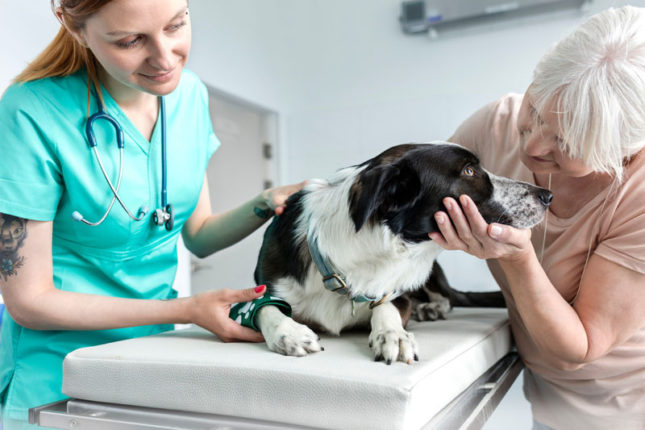
How to Be There for Your Senior Pet
With advancements in veterinary medicine and new treatments and therapies for pets coming out all the time, pets are living longer. While this is great news for pet owners everywhere, caring for aging pets brings about its own challenges. As pets age, they become increasingly at risk of developing age-related health problems. With the right care, however, you can keep your cats or dogs feeling great throughout their golden years.

6 Tips for Caring for Your Senior Pet

1. Expect More Frequent Wellness Exams and Additional Expenses
As pets age, health problems can accelerate. We recommend bi-annual wellness and preventative care appointments. More frequent health screenings ensure new problems are diagnosed and addressed early on and that ongoing treatments are adjusted when needed.
It’s important to plan for the cost of additional appointments and treatments. Pet insurance can help offset costs, but make sure your veterinarian accepts the provider before purchasing a plan.
2. Know How to Recognize the Signs of Illness and Pain
Pets instinctively mask signs and symptoms of illness, so it’s up to you to observe your aging pet’s behavior, appetite, and appearance for changes that could indicate illness.
3. Make Lifestyle and Dietary Adjustments
Senior-pet-proof your home by adding ramps where needed, purchasing an orthopedic pet bed, and elevating your pet’s food and water bowls. Talk with your veterinarian about dietary adjustments or supplements that could improve your pet’s health while managing weight.
4. Exercise Gently
Older pets — especially those that have arthritis — will benefit immensely from staying physically active. Look for gentle ways to exercise that will burn calories while going easy on your aging pet’s joints. We recommend swimming and frequent walks.


5. Stay Mental Fit
Keeping your pet’s mind active is just as important. Aging dogs are susceptible to canine cognitive dysfunction which is similar to dementia in humans. You can help keep your pet’s mind strong by continuing training, puzzle treat games, and continuing to play and explore safely.
6. Address Dental Health
Dental health is important to maintain through a pet’s life, but addressing dental concerns like periodontal disease becomes even more important with age.
Schedule a Senior Pet Appointment with Our Goldsboro Veterinarian
The age at which a dog or cat is considered a senior depends on the pet’s species, breed, size, and condition. Our veterinarian can help you determine when your pet is a senior and provide you with recommendations for adjusting care as needed. To learn more or schedule a veterinary appointment, contact Eastwaye Veterinary Clinic today.




